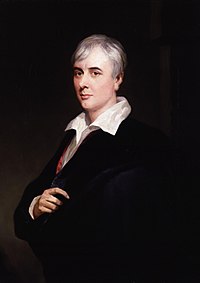George Borrow
| George Henry Borrow | |
|---|---|

1843 portrait by Henry Wyndham Phillips at NPG
|
|
| Born |
5 July 1803 East Dereham, Norfolk |
| Died |
26 July 1881 (aged 78) Lowestoft, Suffolk |
| Occupation | author |
| Notable work | The Bible in Spain (1843); Lavengro (1851); Romany Rye (1857); Wild Wales (1862) |
| Spouse(s) | Mary Clarke (?–1869) |
| Parent(s) |
Ann Perfrement, Thomas Borrow |
Ann Perfrement,
George Henry Borrow (5 July 1803 – 26 July 1881) was an English author who wrote novels and travelogues based on his experiences traveling around Europe. Over the course of his wanderings, he developed a close affinity with the Romani people of Europe, who figure prominently in his work. His best known books are The Bible in Spain, the autobiographical Lavengro, and The Romany Rye, about his time with the English Romanichal (gypsies).
Borrow was born at East Dereham, Norfolk, the son of Army recruiting officer Thomas Borrow (1758–1824) and farmer's daughter Ann Perfrement (1772–1858). He was educated at the Royal High School of Edinburgh and Norwich Grammar School.
He studied law, but languages and literature became his main interests. In 1825, Borrow began his first major European journey, walking in France and Germany. Over the next few years he visited Russia, Portugal, Spain and Morocco, acquainting himself with the people and languages of the various countries he visited. After his marriage on 23 April 1840, he settled in Lowestoft, Suffolk, but continued to travel both inside and outside the UK.
Having a military father, Borrow had a childhood of growing up at different posts. In the autumn of 1815, he accompanied the regiment to Clonmel in Ireland. There he attended the Protestant Academy, where he learned to read Latin and Greek ‘from a nice old clergyman’. He was also introduced to the Irish language by a fellow student named Murtagh, who tutored him in return for a pack of playing cards. In keeping with the political friction of the time, he learned to sing "the glorious tune 'Croppies Lie Down' " at the military barracks. He was introduced to horsemanship and learned to ride without a saddle. The regiment moved to Templemore early in 1816, and George took to ranging around the country on foot and later on horseback.
...
Wikipedia
